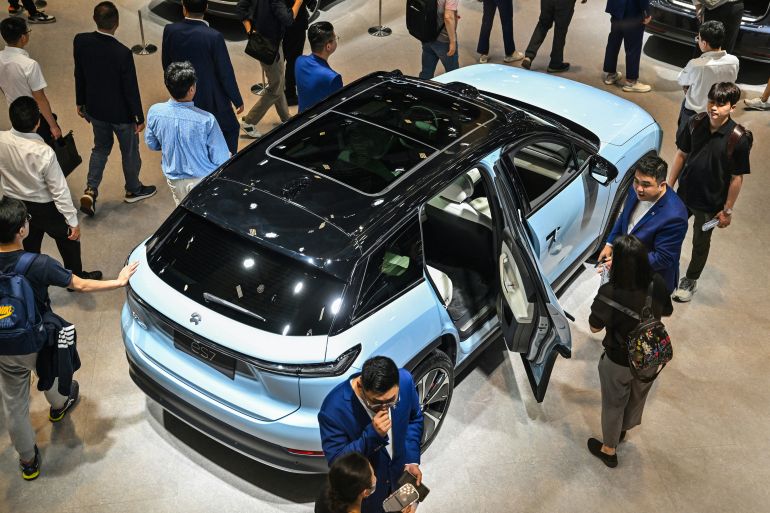EU launches probe into Chinese subsidies for electric vehicles
Anti-subsidy investigation is highest-profile case against China since EU probe into Chinese solar panels a decade ago.

The European Union has opened a probe into China’s subsidies for electric vehicle makers, amid concerns the payments are harming European companies.
“Global markets are now flooded with cheaper Chinese electric cars, and their price is kept artificially low by huge state subsidies. This is distorting our market,” European Commission President Ursula von der Leyen told EU lawmakers on Wednesday.
Keep reading
list of 4 itemsChina promised climate action. Its emissions topped US, EU, India combined
Sweden, EU say Swedish national has been held in Iran since last year
EU must prepare to grow to more than 30 members: Von der Leyen
“As we do not accept this distortion from the inside in our market, we do not accept this from the outside,” von der Leyen said. “So, I can announce today that the commission is launching an anti-subsidy investigation into electric vehicles coming from China.”
The probe is the highest-profile case against China since an EU probe into Chinese solar panels narrowly avoided a trade war a decade ago.
The Commission will have up to 13 months to assess whether to impose tariffs above the standard 10 percent EU rate for cars.
The anti-subsidy investigation covers battery-powered cars from China, including non-Chinese brands made there, such as Tesla, Renault and BMW.
The move is a victory for France, which has expressed concerns that Europe will fall behind during the green transition if it is not more assertive when confronted with China’s alleged protectionism.
But some EU member states, including Germany, are wary of angering Beijing, since they rely on trade relations with China, although Berlin welcomed the probe Wednesday.
China’s leaders have helped make the country the biggest market for electric vehicles by investing billions of dollars in subsidies to get an early lead in what is seen as a promising industry.
Global automakers face growing competition in their home regions from Chinese brands that are taking market share.
Electric vehicle makers including BYD Auto and Geely Group’s Zeekr unit began sales this year in Japan and Europe. Geely also owns Sweden’s Volvo Cars and its all-electric luxury brand, Polestar.
Von der Leyen said Europe was open to competition but was “not for a race to the bottom”.
European car makers hailed the EU’s investigation as a “positive signal”.
“The European Commission is recognising the increasingly asymmetric situation our industry is faced with, and is giving urgent consideration to distorted competition in our sector,” said Sigrid de Vries, director general of the European Automobile Manufacturers Association.